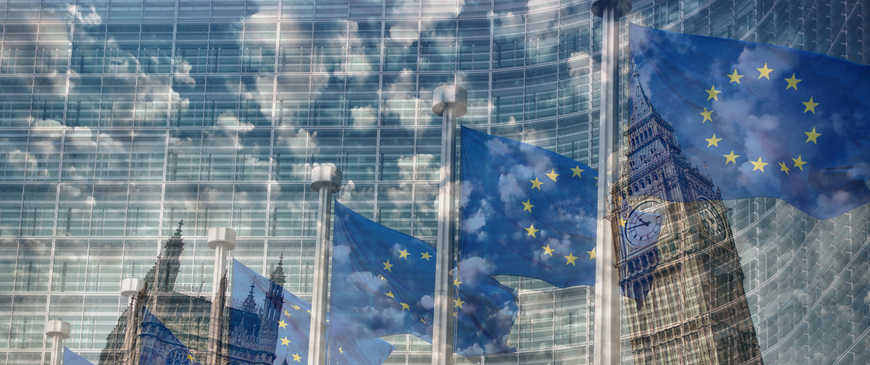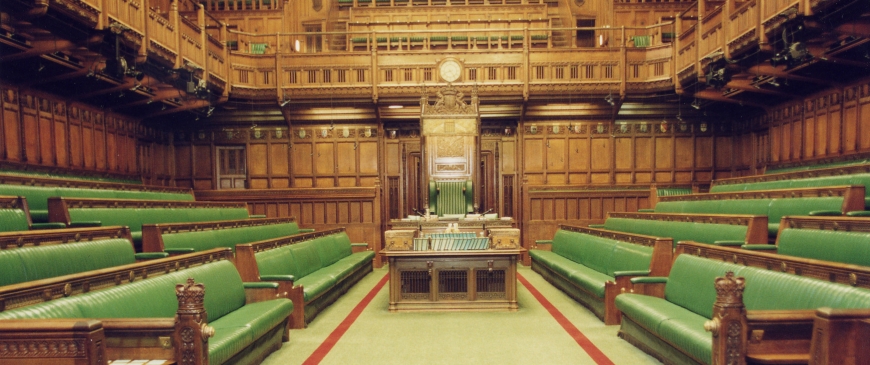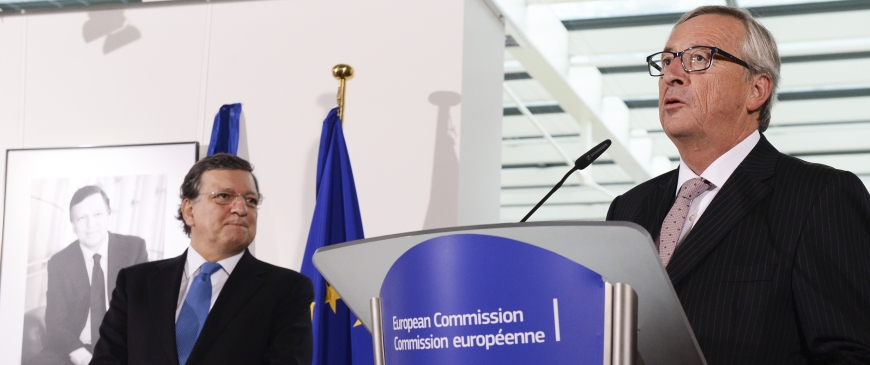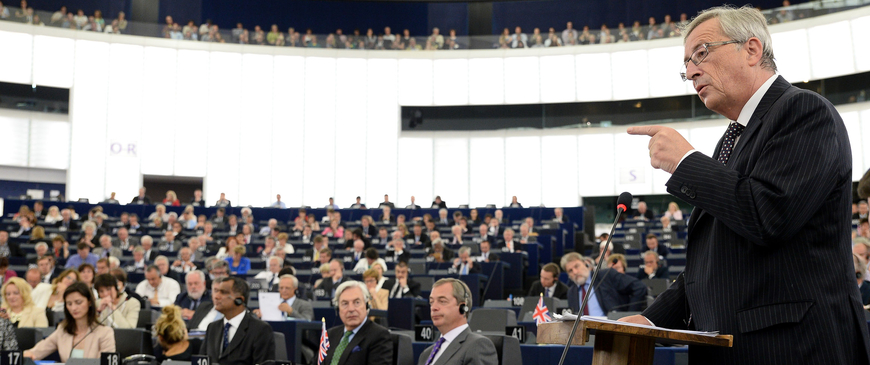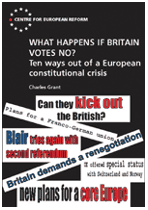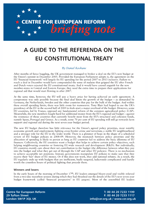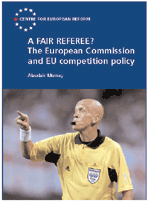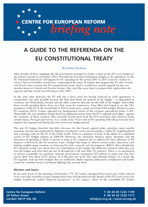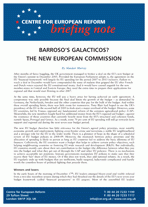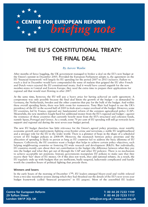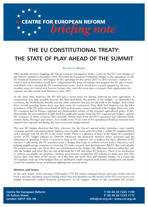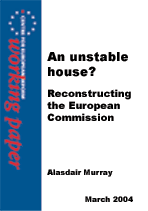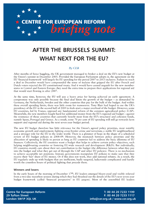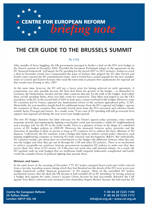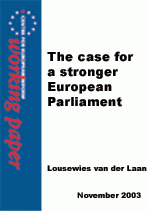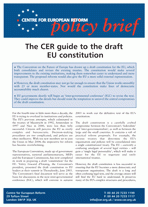EU treaties & institutions
What happens if Britain votes No?: Ten ways out of a constitutional crisis
01 February 2005
If the rest of the EU adopts the constitutional treaty but the British vote against it, the Union faces crisis and instability. Charles Grant looks at what may happen next. Would there be a second referendum, or an attempt to renegotiate the treaties?
Will the French vote 'Non'
01 February 2005
President Jacques Chirac recently declared that the French referendum on the EU's constitutional treaty would take place "before the summer", and not in the second half of 2005 as previously planned.
Issue 40 - 2005
28 January 2005
- Europe's transformative power, Mark Leonard
- Making multilateralism work, Lord Hannay
- Will the French vote 'Non', Aurore Wanlin
A guide to the referenda on the EU constitutional treaty
27 October 2004
On October 29th EU leaders will formally sign the new EU constitutional treaty at a ceremony in Rome. The 25 EU governments will then have two years to ratify the document. Governments can ratify the constitutional treaty by a parliamentary vote, or they can hold a referendum – in a...
A fair referee? The European Commission and EU competition policy
01 October 2004
The EU's policies for enforcing competition and restricting state subsidies are among its biggest success stories. But the way the European Commission conducts these policies is coming under attack.
A guide to the referenda on the EU Constitutional treaty
01 October 2004
On 29 October 2004 EU leaders will formally sign the new EU constitutional treaty at a ceremony in Rome. The 25 EU governments will then have two years to ratify the document. Governments can ratify the constitutional treaty by a parliamentary vote, or they can hold a referendum – in a few member-states a referendum is mandatory.
Barroso's Galacticos? The new European Commission
06 August 2004
José Manuel Durão Barroso unveiled his new Commission on 12 August 2004 – confirming his burgeoning reputation as a deft political tactician. Barroso has crafted a carefully balanced team, which emphasises his own independence as incoming Commission president.
The recipe for a successful Commission
02 August 2004
Dear José Manuel Durao Barroso,Congratulations on your appointment as president of the European Commission. You were not everyone's first choice for the post in fact you were initially not even in the running.
Issue 37 - 2004
30 July 2004
- The recipe for a successful Commission, Alasdair Murray
- Is tax competition bad?, Katinka Barysch
- The peculiarities of the British, Charles Grant
The EU constitutional treaty: The final deal
25 June 2004
EU leaders finally reached agreement on the EU's new constitutional treaty at their Brussels summit on 18 June 2004. Although the summit was marked by a series of acrimonious exchanges, particularly between Jacques Chirac and Tony Blair, EU leaders were determined to agree the new treaty, following the embarrassing collapse of their previous summit in December 2003.
The EU constitutional treaty: The state of play ahead of the summit
03 June 2004
European leaders gather in Brussels on 17-19 June 2004 for a 'make or break' summit on the EU's new constitutional treaty. The last time they tried, at the EU summit in December 2003, they failed to agree on the details of the document.
If Britain votes no ...
01 June 2004
Some people claim to know what will happen if a British referendum defeats the European constitutional treaty. Michael Howard, the Conservative leader, points out that the treaty cannot enter into force unless it is ratified by every member-state.
Issue 36 - 2004
28 May 2004
- Where are the Eastern hordes?, Heather Grabbe
- Who's afraid of the charter of rights?, Mónica Roma
- If Britain votes no ..., Charles Grant
An unstable house? Reconstructing the European Commission
05 March 2004
For fifty years, the Commission has not only overseen the EU's day-to-day functioning, it has also often led the debate on the Union's direction and future. However, over the last decade or so, the Commission has lost much of its credibility.
Should Britain hold a referendum on the EU Constitution?
01 January 2004
Dear Charles,
European leaders are busy drawing up a constitution which will set out what tasks the EU should and should not perform; clarify who is responsible for what; and specify how the EU takes decisions. Once governments have agreed a final text, the question becomes: how should each country...
European leaders are busy drawing up a constitution which will set out what tasks the EU should and should not perform; clarify who is responsible for what; and specify how the EU takes decisions. Once governments have agreed a final text, the question becomes: how should each country...
After the Brussels summit: What next for the EU?
16 December 2003
The manner and speed at which the Brussels European Council collapsed took most observers by surprise. Heads of state and government had arrived on the morning of Friday 12 December 2003, expecting negotiations to last until late on Sunday 14.
The CER guide to the Brussels summit
05 December 2003
It is six months since the European Convention, a gathering of parliamentarians, government representatives and experts, presented its draft for an EU constitutional treaty. Since November, the EU governments – the current 15, plus the ten due to join on 1 May 2004 – have been negotiating a revision of this draft, in an 'inter-governmental conference' (IGC).
Issue 33 - 2003
28 November 2003
- Is Europe working? , Katinka Barysch
- Should Britain hold a referendum on the EU Constitution?, Steven Everts and Charles Grant
- A joined-up EU security policy , Daniel Keohane and Adam Townsend
The case for a stronger European Parliament
07 November 2003
The EU urgently needs a stronger and reformed European Parliament (EP). With 60 per cent of all legislation affecting citizens' lives discussed in Brussels, EU decision-making must become more democratic.
The CER guide to the draft EU constitution
03 October 2003
For the fourth time in little more than a decade, the EU is trying to overhaul its institutions and policies. The EU’s previous attempts, which culminated in the treaties of Maastricht in 1992, Amsterdam in 1997 and Nice in 2000, were less than fully successful. Citizens still perceive the EU...

